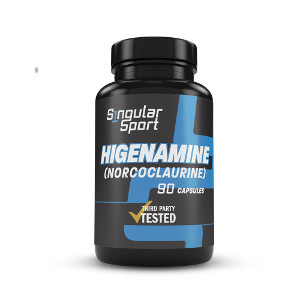It’s a popular ingredient in some dietary supplements and, though it’s a banned substance under international sports doping rules, it’s use is still widespread in sports ‘energy drinks’ and weight loss products. The problem is, high doses can increase the risk of cardiovascular problems…
 Olympians, professional athletes and amateurs whose competitions are governed
Olympians, professional athletes and amateurs whose competitions are governed
by the regulations of the World Anti-Doping Agency should steer clear
of supplements or products containing higenamine…
A study recently published in the journal Clinical Toxicology reveals that hygenamine, a common additive in sports energy drinks and consumer health supplements, may increase your risk of developing a number of heart-related diseases and conditions. The problem is not the substance itself, but the fact that relatively loose regulations on labelling of such products can lead to ‘overdosing’ on it.
What they found…
The independent study was conducted by researchers at global public health organization NSF International, Harvard Medical School and the National Institute for Public Health and the Environment (RIVM) in the Netherlands.
Researchers studied 24 products labeled as containing higenamine (or its synonyms ‘norcoclaurine’ or ‘demethylcoclaurine’) and found unpredictable and potentially harmful quantities of the stimulant ranging from trace levels to 62 mg per serving. Of the 24 products tested, only five listed a specific quantity of higenamine on the label, and none of those five quantities were accurate. Based on the labeled directions for use, consumers could be exposed to up to 110 mg of higenamine per day.
Higenamine is also a natural component of several traditional botanical remedies, such as aconite root and Aristolochia brasiliensis.
Dietary supplements lead to an estimated 23,000 emergency department visits each year in the United States, and weight loss and sports supplements contribute to a large portion of these emergency department visits, the study notes.
What it means…
The health risks of higenamine remain poorly understood, but as a beta-2 agonist, it has been prohibited from sport by the World Anti-Doping Agency (WADA), and, therefore, poses a risk to competitive athletes’ careers if they get caught using it.
“We’re urging competitive and amateur athletes, as well as general consumers, to think twice before consuming a product that contains higenamine,” says John Travis, Senior Research Scientist at NSF International and a co-author of the study. “Beyond the doping risk for athletes, some of these products contain extremely high doses of a stimulant with unknown safety and potential cardiovascular risks when consumed. What we’ve learned from the study is that there is often no way for a consumer to know how much higenamine is actually in the product they are taking.”
The bottom line…
The study recommends further investigation into the effects of higenamine and more-formal regulation and labelling of supplements and products containing it. Sounds like a good idea to me. My overall reaction, to the study’s findings was: this stuff does more harm than good. Just stay away from it!
~ Maggie J.

